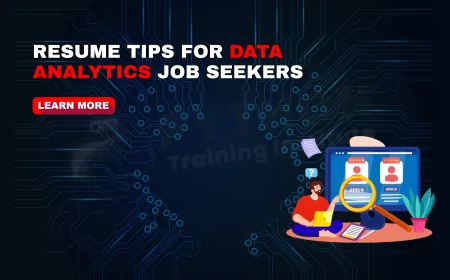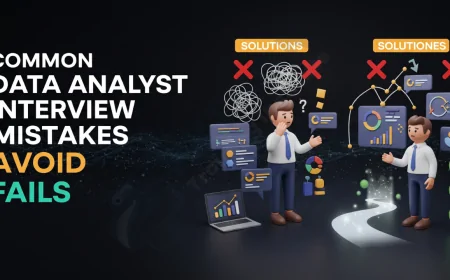Best Project | Based Python Courses Online to Boost Your Career in 2025
Discover the best project-based Python courses online in 2025! Learn from top Python training institutes in Pune, build real-world projects, and boost your career with practical coding skills and placement support. Ideal for beginners, professionals, and job seekers.

Python is not just a programming language—it’s a problem-solving tool, a career enabler, and one of the most accessible technologies for people of all backgrounds. Whether you're building your first app, automating reports, analyzing data, or diving into artificial intelligence, Python is the go-to language. But learning syntax alone isn’t enough. To master Python, you need to build real-world projects.
Project-based learning helps you bridge the gap between theory and practice. It reinforces problem-solving, encourages creativity, and gives you something concrete to showcase. This is why learners today are increasingly searching for project-based Python courses that go beyond slides and quizzes.
This blog explores the best kinds of project-based Python courses available online—categorized by type, depth, career goals, and use case. You’ll also discover key elements to look for in a course, challenges to expect, and how to build a strong Python portfolio using real projects.
Why Choose Project-Based Learning for Python?
Learning Python through real projects offers a different kind of immersion. It’s practical, productive, and purpose-driven. You don’t just learn syntax—you solve problems.
Top reasons to choose project-based Python courses:
| Benefit | Description |
|---|---|
| Hands-On Practice | Reinforces skills through actual coding challenges |
| Real-World Readiness | Teaches how to solve practical problems, not just toy examples |
| Portfolio Development | Enables you to showcase your skills to employers |
| Confidence Boost | Builds coding confidence through problem-solving experience |
| Retention and Engagement | Makes learning fun, relevant, and memorable |
Unlike passive tutorials, project-based courses force you to think, research, break problems down, and build solutions—exactly like you would in a job.
What Makes a Great Project-Based Python Course?
Before we dive into course types, it's important to know what separates a quality project-based course from the rest.
Checklist for identifying a strong project-based Python course:
-
Projects Start Early
Good courses begin with small projects early in the curriculum instead of waiting until the end. -
Each Module Has a Mini Project
Every major concept (e.g., loops, functions, files, APIs) is followed by a hands-on activity. -
Scalability of Projects
Projects grow in complexity—from simple text apps to full web scrapers or GUI-based applications. -
Problem-Focused Learning
You’re solving real problems, such as tracking expenses, parsing data from websites, or automating reports. -
Code Review or Solution Walkthroughs
Instructors walk you through a full solution, teaching how to debug and optimize. -
Encourages Creativity
You’re encouraged to extend projects with new features and explore beyond the course. -
Output is Portfolio-Ready
Courses help you package your project with README files, screenshots, and documentation.
Categories of Project-Based Python Courses
Different learners have different goals. The courses you choose should align with where you want Python to take you—whether that's data science, web development, automation, or just general programming.
Below are the most popular types of project-based Python courses online:
1. Beginner-Friendly Python Project Courses
Perfect for those with no programming background. These courses focus on:
-
Core Python syntax
-
Functions, loops, and conditions
-
File reading/writing
-
Basic error handling
Typical Projects Included:
| Project Title | Learning Objective |
|---|---|
| Calculator App | Variables, math operators, user input |
| Number Guessing Game | Loops, conditions, random number generation |
| To-Do List | Lists, user input, file handling |
| Expense Tracker | Working with files and basic reporting |
These courses are foundational. They teach you how to build, test, and modify simple but complete applications.
2. Intermediate Python Projects Courses
Once you’re comfortable with the basics, you can step into intermediate-level challenges. These courses typically teach:
-
Working with external libraries
-
Object-Oriented Programming (OOP)
-
APIs and JSON data
-
Basic database interaction
Typical Projects Included:
| Project Title | Learning Objective |
|---|---|
| Weather App | Fetching real-time data using APIs |
| URL Shortener | Dictionaries, string manipulation, random IDs |
| Contact Book (CLI) | Classes, file-based data storage |
| Web Scraper | HTML parsing, data extraction with libraries |
These projects simulate real-world scenarios that closely resemble problems you'd face in development or IT roles.
3. Python for Web Development Courses (Project-Based)
If your goal is to build websites or web apps, these courses focus on Python as a backend tool. Expect to work with:
-
Web frameworks
-
HTML templating
-
Forms and user input handling
-
Databases (SQL, SQLite, NoSQL)
Typical Projects Included:
| Project Title | Learning Objective |
|---|---|
| Blog CMS | CRUD operations, routing, templating |
| Notes App with Login | User authentication, sessions |
| Product Review Website | Form handling, database queries |
| Portfolio Website | Routing, templating, styling |
These courses often culminate in you deploying a website on a free server, giving you a publicly accessible link.
4. Python for Data Analysis and Visualization
These courses combine Python with popular data libraries and focus on real datasets. You’ll explore:
-
DataFrames and Series
-
Reading CSV, Excel, or JSON data
-
Cleaning and filtering data
-
Creating plots and dashboards
Typical Projects Included:
| Project Title | Learning Objective |
|---|---|
| COVID-19 Data Dashboard | Real-time data processing and visualization |
| Stock Market Analyzer | API usage, plotting, trend analysis |
| Customer Churn Predictor | Data cleaning, feature engineering |
| Survey Result Analyzer | Aggregating and charting user feedback |
You’ll work with datasets that mirror real industry problems and learn how to draw insights from raw information.
5. Python for Automation and Scripting Courses
These courses are ideal for people who want to automate everyday tasks or improve workplace productivity. You’ll use Python to interact with:
-
Files and folders
-
Emails and reports
-
Excel sheets
-
Web browsers
Typical Projects Included:
| Project Title | Learning Objective |
|---|---|
| Bulk File Renamer | OS modules, string handling |
| Email Automation Bot | Sending emails through SMTP |
| Web Form Auto-Filler | Automating with web browser libraries |
| Daily Report Generator | Reading Excel, formatting data, saving reports |
These courses save you hours of manual work and are popular among non-developers and system administrators.
6. Advanced Python Projects Courses
Once you’ve mastered core topics, these courses explore advanced areas like:
-
GUI applications
-
Multithreading
-
Advanced OOP
-
API design
Typical Projects Included:
| Project Title | Learning Objective |
|---|---|
| Chat Application | Sockets, threading, message queues |
| Inventory Management Tool | CRUD, file/database storage, advanced OOP |
| Image Converter GUI | Using libraries to manipulate media |
| Code Snippet Manager | Working with databases and user authentication |
These courses prepare you for large-scale applications and are often close to what developers do in real jobs.
How to Get the Most Out of a Project-Based Python Course
To maximize your learning:
1. Don’t Just Watch—Code Along
Pause videos and write every line of code. Don’t copy-paste. Typing helps muscle memory and error recognition.
2. Modify the Project
Change the UI, add new features, and test with different inputs. Customization deepens your understanding.
3. Document Everything
Write README files. Add comments. This builds your portfolio and improves clarity.
4. Use Version Control
Track changes with Git. Hosting your projects on GitHub shows professionalism and improves team-readiness.
5. Share Your Work
Post your finished projects online. Use forums or social platforms to get feedback and connect with others.
Challenges with Project-Based Courses (And How to Overcome Them)
| Challenge | Solution |
|---|---|
| Getting Stuck on Bugs | Use print statements, break code into chunks |
| Overwhelmed by New Concepts | Take breaks, revisit fundamentals |
| Lacking Project Ideas | Expand or combine course projects creatively |
| Burnout or Lack of Motivation | Set small milestones, reward progress |
Project-based learning is immersive but can be mentally taxing. Keeping a learning journal or schedule helps.
FAQ's
1. What are the best project-based Python courses online?
The best project-based Python courses online offer hands-on learning with real-world applications. A top Python Training Institute in Pune provides curated modules including web development, data science, and automation projects, helping learners build a job-ready portfolio and gain practical experience essential for a successful Python career.
2. How do project-based Python courses help in career growth?
Project-based courses boost your career by offering real-time coding experience and practical problem-solving. Reputed institutes in Pune focus on industry-driven projects, which improve your coding confidence and make your resume more attractive to employers hiring for Python roles in web development, AI, or data science.
3. Why choose a Python Training Institute in Pune for project-based learning?
A Python Training Institute in Pune offers a blend of expert mentorship and project-rich curriculum. Students work on mini and capstone projects reflecting real-time industry problems, making them more employable and skilled for roles like Python Developer, Data Analyst, or Full Stack Engineer.
4. Are online Python courses with projects suitable for beginners?
Yes, online Python courses with projects are beginner-friendly if structured well. Institutes in Pune offer step-by-step modules that begin with basics and gradually introduce projects like calculators, CRUD apps, and data visualizations, making the learning curve smoother and more engaging for newcomers.
5. What kind of projects are included in Python training courses?
Top Python courses include projects like e-commerce websites, chatbots, automation tools, web scrapers, and data dashboards. Institutes in Pune design these to mimic real-world problems, ensuring learners understand both theoretical concepts and practical implementation, making them job-ready.
6. Can I get placement assistance after a project-based Python course?
Yes, reputed Python institutes in Pune offer 100% placement assistance. Their project-based approach prepares students with interview-ready skills, resume building, and real-world projects that impress recruiters, increasing the chances of landing jobs in tech companies.
7. How long does a project-based Python course take to complete?
Most online project-based Python courses from top Pune institutes last between 8 to 16 weeks. They are designed with flexible modules and project submissions, enabling learners to study at their own pace while ensuring hands-on coding experience.
8. Are certificates provided after completing project-based Python courses?
Yes, Python Training Institutes in Pune provide industry-recognized certificates upon course completion. These certificates validate your hands-on skills and project experience, enhancing your profile for roles in development, automation, or data-driven fields.
9. What is the average cost of online project-based Python training?
The average cost ranges from ₹10,000 to ₹25,000. Institutes in Pune offer affordable pricing for project-based courses, often bundled with certifications, placement support, and lifetime access to learning material—offering great ROI for aspiring developers.
10. Do Python courses in Pune cover full stack development projects?
Yes, many institutes include full stack development projects using Python frameworks like Django or Flask. These courses allow learners to build complete web applications with frontend and backend integration, preparing them for roles as Full Stack Python Developers.
11. Is prior coding knowledge required for project-based Python courses?
Not necessarily. Many institutes in Pune design beginner-friendly Python courses that start with foundational concepts. As students progress, they are introduced to hands-on projects, ensuring they learn to code through practical application, even without prior experience.
12. What makes project-based Python training better than theory-only courses?
Project-based training emphasizes real-time coding and problem-solving. Python institutes in Pune use this approach to bridge the gap between theory and real-world application, enabling learners to build job-relevant skills and a portfolio that showcases their practical expertise.
13. Can working professionals benefit from project-based Python courses?
Absolutely. Working professionals in Pune or elsewhere gain practical skills through flexible, project-based learning. These courses often include automation scripts, APIs, and data handling projects relevant to their industry, making them more efficient and promotable in their current roles.
14. What tools and libraries are covered in project-based Python courses?
Courses typically cover libraries like Pandas, NumPy, Matplotlib, Flask, Django, and automation tools like Selenium or BeautifulSoup. Institutes in Pune integrate these into live projects, ensuring learners understand how to apply each tool in real-world scenarios.
15. How do Python projects help in freelancing opportunities?
Project-based learning equips students with a portfolio that demonstrates their capability. With practical experience from a Pune-based course, freelancers can showcase completed work in data analysis, web development, or automation, helping them attract and retain clients.
16. Are project-based Python courses available on weekends?
Yes, most Python institutes in Pune offer flexible weekend batches to accommodate students and working professionals. These weekend courses are equally project-intensive and ensure that learners can balance learning with their personal and professional commitments.
17. Do these Python courses include resume and interview preparation?
Top Python institutes in Pune integrate career support, including mock interviews, resume building, and GitHub portfolio setup. By highlighting completed projects and coding skills, they increase students' chances of securing job offers in Python and tech domains.
18. What is the best way to practice Python through projects?
The best way is to enroll in a project-based course that offers guided mentorship, problem statements, and deadlines. Institutes in Pune provide structured paths where students apply each concept in practical mini-projects, enhancing their coding fluency and problem-solving skills.
19. Can I build a data science portfolio with Python projects?
Yes, institutes in Pune offer Python training with data science-focused projects like sentiment analysis, sales forecasting, and data visualizations. These hands-on projects form a strong portfolio that showcases your ability to handle real datasets and analytical tasks.
20. How does project-based learning prepare me for Python certifications?
Project-based learning reinforces Python concepts through application, helping you master syntax, logic, and libraries. Pune-based institutes combine this with exam preparation, making it easier to crack Python certifications like PCEP, PCAP, or more advanced data science certifications.
Final Thoughts
There’s no better way to learn Python than by building with it. Project-based courses take you beyond repetition and into creation. They teach you not only the language but how to think like a programmer—how to solve, debug, test, and improve.
Whether you’re aiming for a new job, automating your work, or exploring a side hobby, these Python project courses online will prepare you with the skills and confidence to apply what you’ve learned in real scenarios.
So, choose the course that aligns with your goals, dive into the projects, and build something you can be proud of.
What's Your Reaction?
 Like
0
Like
0
 Dislike
0
Dislike
0
 Love
0
Love
0
 Funny
0
Funny
0
 Angry
0
Angry
0
 Sad
0
Sad
0
 Wow
0
Wow
0














